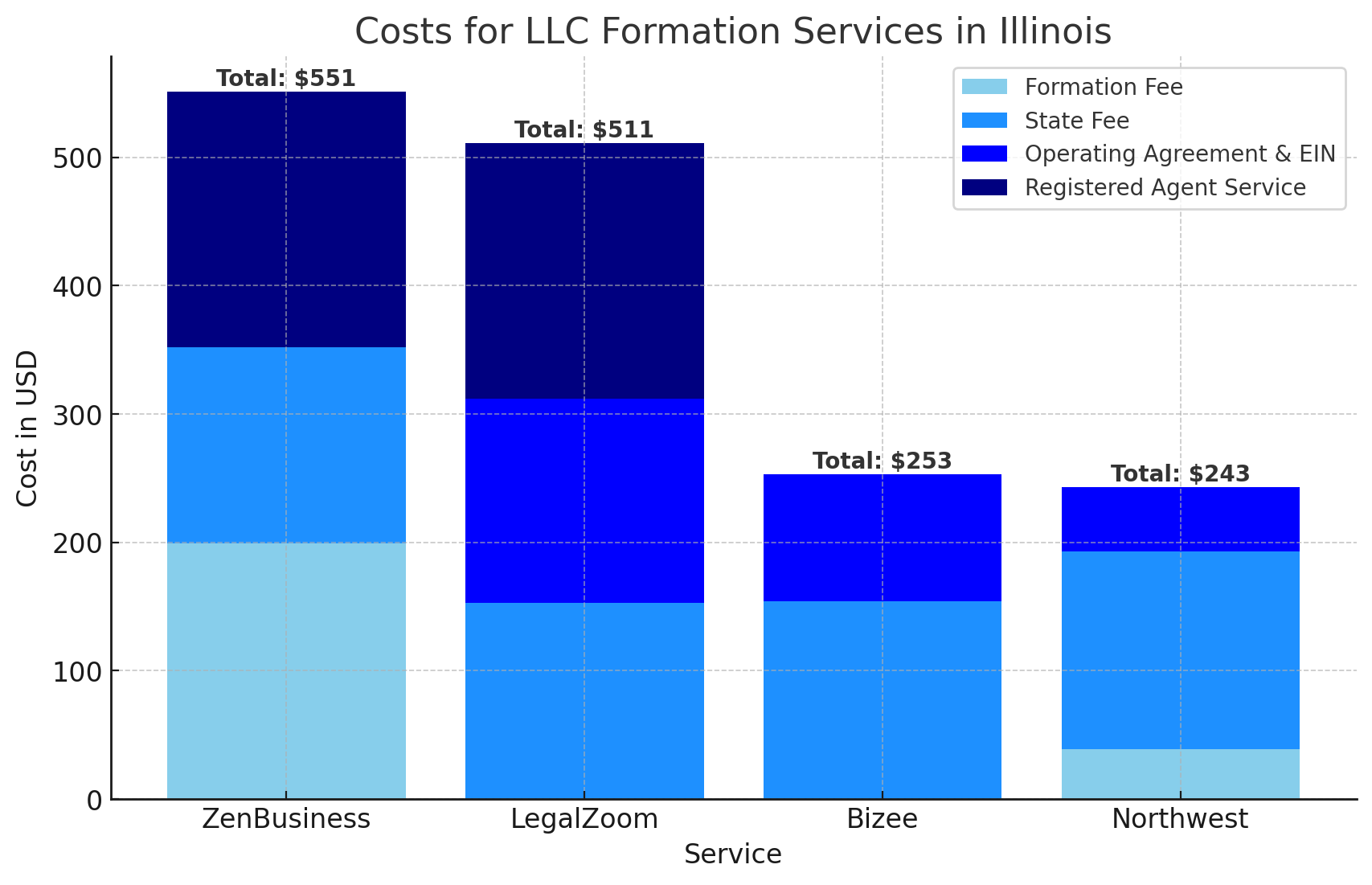Are you ready to turn your entrepreneurial vision into a reality in Illinois? Establishing a Limited Liability Company (LLC) is a significant step in legitimizing your business and protecting your personal assets.
This guide is meticulously designed to simplify the process of forming your LLC in Illinois, presenting each step in a clear, straightforward, and easy-to-understand manner.
Whether you're at the beginning of your business journey or looking to expand, this article will navigate you through the essential aspects of Illinois LLC formation.
Options for Forming an LLC in Illinois
There are several routes you can take to form your LLC in Illinois:
- Do-It-Yourself (DIY): Suitable for those who are comfortable with navigating legal procedures and prefer a hands-on approach.
Go to the Illinois Business Services website to set up the LLC and then to the IRS’s website to get your EIN (Employer Identification Number). - Hiring a Lawyer: Ideal for obtaining tailored legal advice and addressing complex business scenarios.
- Using a Formation Service: A cost-effective and efficient option for many. Popular services include Bizee, ZenBusiness, LegalZoom, and Northwest Registered Agent.

This guide aims to provide you with clear and expert guidance at each phase of your Illinois LLC formation journey.
Steps to Form an LLC in Illinois
The process of forming an LLC in Illinois involves several key steps:
- Choose Your LLC’s Name: Ensure the name is unique in Illinois, includes "Limited Liability Company" or its abbreviations, and adheres to Illinois's naming guidelines.
Illinois rules for naming LLCs are detailed in §805 ILCS 180/1-10. - Designate a Registered Agent: Appoint a registered agent with a physical address in Illinois to manage your LLC's legal paperwork.
- File the Articles of Organization: Submit this document to the Illinois Secretary of State, detailing your LLC's name, address, registered agent, and management structure. The filing fee is $150.
- Draft an Operating Agreement: While not required in Illinois, it's crucial for outlining your LLC's operational and management plans.
- Obtain an Employer Identification Number (EIN): This is necessary for tax and employment purposes and can be obtained from the IRS website.
- Open a Business Bank Account: This step is vital to separate personal and business finances.
- Fund Your LLC: Inject capital into your business through personal investments, loans, or other funding sources.
- Ongoing Compliance: Ensure to file an annual report and pay the necessary fee to maintain your LLC's good standing in Illinois.
Establishing Your LLC with Northwest Registered Agent
Northwest Registered Agent offers a streamlined process for LLC formation in Illinois. By clicking on the button below, you can use our affiliate link
and form your LLC in Illinois for only $39, plus state fees. This exclusive offer includes their registered agent service free for the first year, adding extra value and savings for your new venture.
We get commissions for purchases made through links in this post.
Legal Considerations and Compliance in Illinois
Adhering to Illinois-specific regulations is crucial. Maintain a registered agent, ensure your LLC name adheres to state criteria, and file your annual reports on time to keep your business in good legal standing.
Benefits of Forming an LLC in Illinois
Forming an LLC in Illinois comes with several advantages, including limited liability protection, potential tax benefits, and operational flexibility. The state's supportive environment for businesses means ample growth opportunities in various sectors.
Common Mistakes to Avoid
Common pitfalls include neglecting legal requirements or commingling personal and business finances. Stay informed, follow state laws, and consider professional services when needed.
Next Steps After Establishing Your LLC
Once your LLC is established, concentrate on developing a robust business plan, implementing effective accounting systems, and marketing your business. Consider using tools and services that aid in efficient business management.
Conclusion
Starting an LLC in Illinois is a pathway filled with opportunities for entrepreneurs. Whether you choose the DIY route, legal assistance, or a formation service like Northwest Registered Agent, it's important to understand each step and comply with all legal requirements. A well-formed LLC is the foundation for a successful business venture.
Start an LLC in Illinois FAQs
Can you be your own registered agent in Illinois?
Yes, but if you act as your own registered agent in Illinois, your name and address will be publicly listed. You'll need to be available during regular business hours to receive any legal documents in person.
Can I change my registered agent after I start an LLC?
Yes. To change your registered agent in Illinois, use this link. You will need to file a Statement of Change of Registered Agent with the Illinois Secretary of State and pay the $25 filing fee.
What’s the difference between a member-managed and manager-managed LLC?
If you go for a member-managed LLC, the members (owners) will handle the day-to-day operations. In a manager-managed LLC, members hire managers to run things. These managers take care of tasks such as hiring and firing employees, managing credit and bank accounts, and signing agreements and contracts.
What should be included in an operating agreement?
A personalized operating agreement addresses both the day-to-day and overarching aspects of your company, encompassing everything from member responsibilities to the dissolution of the business. Here are common topics typically included in operating agreements:
- Initial investments
- Profits, losses, and distributions
- Voting rights, decision-making powers, and management
- Transfer of membership interest
- Dissolving the business
Do I need an EIN for my Illinois LLC?
Yes, you need an EIN if your business has employees, is a multi-member LLC, or is taxed as a corporation. Even if your LLC isn't legally obligated to have an EIN, it's advisable. An EIN allows you to open bank accounts, apply for business licenses, and is generally essential for business operations. It also helps keep your Social Security Number (SSN) private during business transactions.